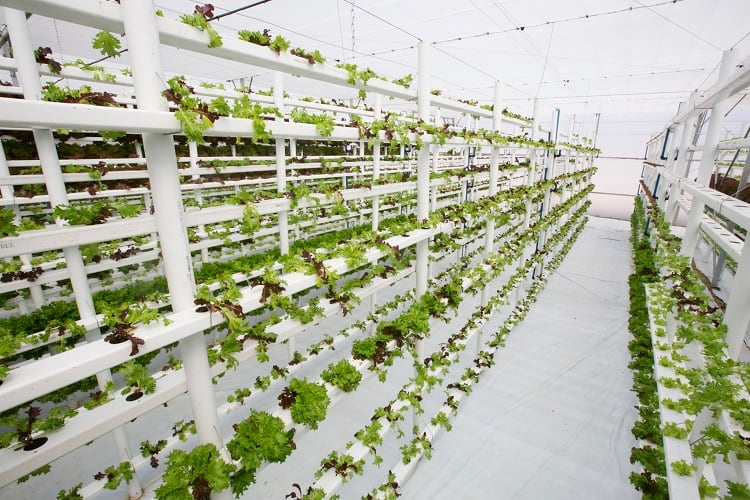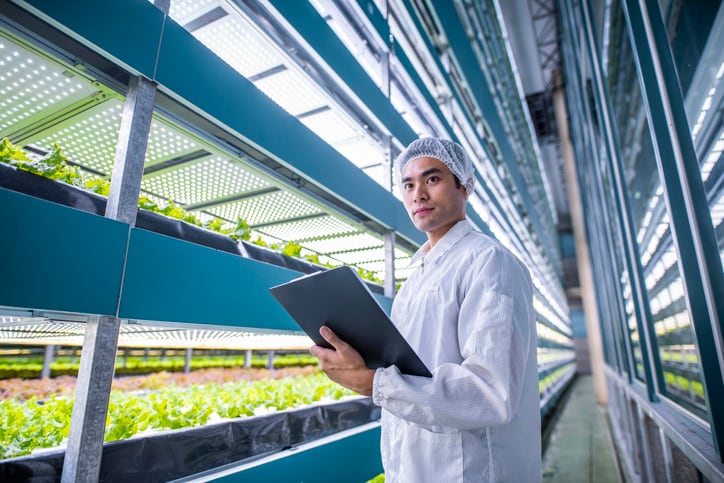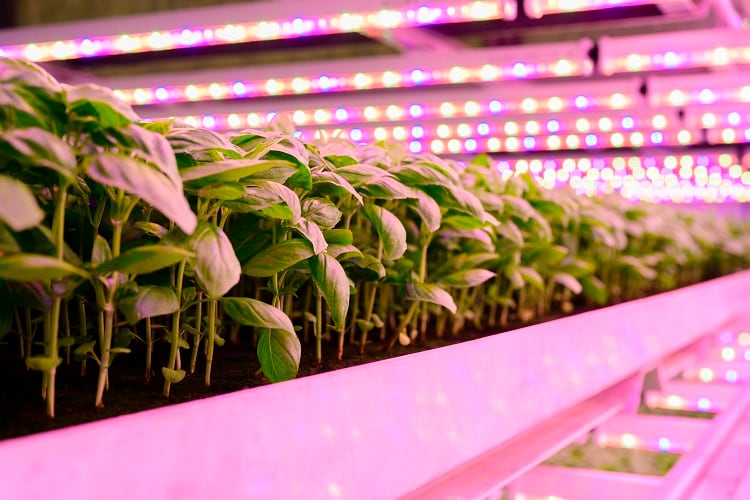Vertical farms are a far cry from where we imagine our vegetables and leafy greens come from: sun-drenched fields overflowing with ripe produce, with farmers attentively tending to their needs.
Instead, vertically farmed plants are grown indoors in controlled environments, usually in the absence of soil and natural light. Such growing conditions likely sound less romantic to the average consumer, and researchers are aware of shopper scepticism about the taste of vertically farmed vegetables.
In response, researchers in Denmark and New Zealand have teamed up to determine whether consumers actually do prefer the taste of organic greens grown in an open field over those vertically farmed.
Bland, watery, pale veggies?
Consumers’ willingness to buy and eat vertically farmed-grown produced presents a potential challenge to the controlled environment agriculture (CEA) industry.
Other known challenges include profitability and environmental sustainability due to heating and cooling requirements. But even if these hurdles are overcome, if consumers are unwilling to eat vertically cultivated greens, the technology is unlikely to stand the test of time.
Scepticism is likely linked to neophobia (fear of the new). Previous research has suggested that consumers from some countries are likely to be more accepting than others: consumer attitudes appear positive in China, Russia, Singapore, India, Malaysia, Germany, the UK, Ireland, and Australia.
But other research suggests that although vertical farmed produce may be more visually appealing than conventional crops, there are concerns regarding taste and flavour. In 2021, around 500 British consumers were asked to describe their expectations of peaches from vertical farmed or organic agriculture. The vertically farmed peaches were thought to be ‘bland/watery in taste’, ‘artificial’, ‘small’ and ‘pale’.
In 2017 and 2020 research, produce labelled as being organic was thought to be ‘fresh’, ‘juicy’, ‘wholesome’, ‘sweet’, ‘high in vitamins’ and have an ‘intense flavour’.
Consumer scepticism is an example of the concept of the psychological train neophobia, commented associate professor Michael Bom Frøst, one of the study authors. “It means that some consumers are not that happy about trying new things. This can be a major obstacle for new technologies and it is important to address through information and consumer education.”
A clear winner on parsley, but others close to call
In what is considered the first study of its kind, researchers from the Department of Food Science in New Zealand sought to determine whether consumer prejudices about vertically farmed produce hold true.
Researchers asked 190 consumers in Denmark to blind taste and rate vertically cultivated vegetables and compare them with their organically grown counterparts. The vegetables analysed were rocket (arugula), baby spinach, pea shoots, basil and parsley.
Findings revealed that the organic greens narrowly came out on top, suggesting consumers liked the vertically farmed produce nearly as much. There was no difference at all in their liking of rocket salads, and such minimal difference between the two varieties of baby spinach and basil that it was hard to pick a winner. Pea shoots were tested twice, one time the vertically farmed variety came out on top, and the other time it was organic.
The only clear winner for participants was organically grown parsley.
“In terms of taste, we certainly have no reason to be sceptical. Indeed, the participants think that the vertically grown plants taste just as good as the ones we consider best – namely the organic ones,” said Bom Frøst,
Promising sustainable nutrition for the future
For Frøst, the study ‘clearly’ demonstrates that consumer prejudices about vertically grown products are debunked ‘as soon as they taste them’. And fellow researcher Sara Jaeger, lead study author, believes the findings pave the way for vertical cultivation to become more widespread than today.
In so doing, vertical farming technology has the potential to improve food security, and if powered with renewable electricity, to reduce the significant environmental impact of conventional agriculture.
Although vertical farming promises to deliver sustainable nutrition, the sector is facing significant hurdles. Rising energy costs of late have seen high-profile CEA operators struggle to stay upright. This year alone has seen Dutch company Glowfarms, UK-based Eider Vertical Farming, and US-based Fifth Season cease operations. Germany-headquartered Infarm announced plans to halve its headcount, downsize operations, and shift its focus to its ‘Growing Centres’. In September, its Dutch arm declared bankruptcy.
“Throughout history, technologies have been invented by humans to put food on the table. Vertical farms are grown under totally controlled conditions, which means that there is enormous food security in relation to attaining the same yield year after year,” commented Jaeger.
“Food security, climate action and biodiversity protection are all headed the wrong way,” she added. “Our food system is incredible central to achieving the Sustainable Development Goals.”
Source: Food Quality and Preference
Consumers’ expectations and experiences of salad greens, herbs, and fruits from vertical farming: Comparison with organic produce
Published online 19 October 2023
DOI: https://doi.org/10.1016/j.foodqual.2023.105020
Authors: Sara R. Jaeger, Sok L. Chheang, Christina M. Roigard, Michael Bom Frøst





